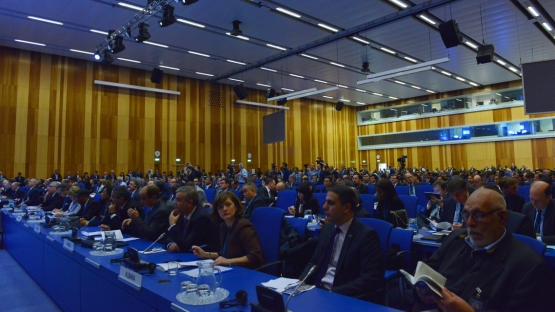Highlighting the collective commitment to improve nuclear security at the national, regional and global levels, being vigilant about the threats to nuclear security, having concrete measures to protect against malicious acts involving nuclear or radioactive material, being cognizant of the need to support the central role of the IAEA: these were key announcements at the conclusion of the International Conference on Nuclear Security: Commitments and Actions last week.
The week-long conference provided an inclusive forum to formulate and exchange views on how to improve nuclear security globally. It attracted over 2000 participants from 139 Member States and 29 organizations - 47 Member States were represented at ministerial level.
The President of the Conference was Mr Yun Byung-se, Foreign Minister of the Republic of Korea. The Co-Chairs of the open-ended consultation process for the preparation of the Ministerial Declaration were Ambassador Song Young-wan from the Republic of Korea and Ambassador Abel Adelakun Ayoko from Nigeria.
A ministerial segment, lasting a day and a half, adopted a Ministerial Declaration by consensus. During the segment, Ministers had the opportunity to share their national perspectives related to nuclear security. Ninety national statements were delivered.
In the Declaration, Ministers announced their commitment “to continuously maintaining and further strengthening nuclear security through national actions, which may involve international cooperation, primarily through the IAEA, as well as through other relevant international organisations and initiatives, in accordance with their respective mandates and memberships.”
The conference underscored the commitment of the international community as a whole to nuclear security and the unique platform the IAEA offers to assist Member States in further strengthening a global response to a global threat.
Another important message was encouragement of the universalization of the Amendment to the Convention on the Physical Protection of Nuclear Material (A-CPPNM) which entered into force on 8 May 2016. The importance of adherence to the CPPNM and its Amendment was also highlighted.
The conference’s scientific and technical sessions comprised of six high level sessions on broad themes central to nuclear security and more than 30 technical sessions on specialized scientific, technical, legal and regulatory issues concerning nuclear security.
The technical sessions addressed a wide range of nuclear security related subjects including: evolving challenges and threats to nuclear security; identifying gaps and strategies on the secure management of radioactive material; international instruments for nuclear security; nuclear forensics; computer security for industrial control systems in nuclear facilities; public engagement on nuclear security; and nuclear security education.
The global challenge in checking and preventing unmanned aerial vehicles (UAVs, also known as ‘drones’) from posing threats to nuclear and other radioactive facilities was discussed. Participants stated the importance of having stringent legal and regulatory controls in the use of drones. The benefits of UAV’s in the nuclear sector were also highlighted, such as their use to enhance security at nuclear facilities, their role in emergency response and tracking radiation in the environment.
Another topic discussed was the threat from cyberattacks at nuclear facilities. National efforts to strengthen cybersecurity and testing computer security controls that are critical to improving security at nuclear facilities were highlighted. Nuclear power plant operators, vendors, national regulators and international organizations recognise that cyber threats are constantly evolving and that they need to proactively engage in collaborative efforts to enhance cybersecurity to prevent any unwarranted events that could lead to a nuclear or radiological emergency.
Participants also exchanged experience on how to implement effective measures against ‘insider threats’ to reduce the risk of the theft of nuclear and other radioactive material and possible sabotage of nuclear facilities.
A number of side events took place on the margins of the Conference, in particular an event commemorating 20 years of the International Physical Protection Advisory Service (IPPAS) service and on scaling up worldwide capacity to manage disused sealed radioactive sources.
A President’s Report will be published on the conference site.




